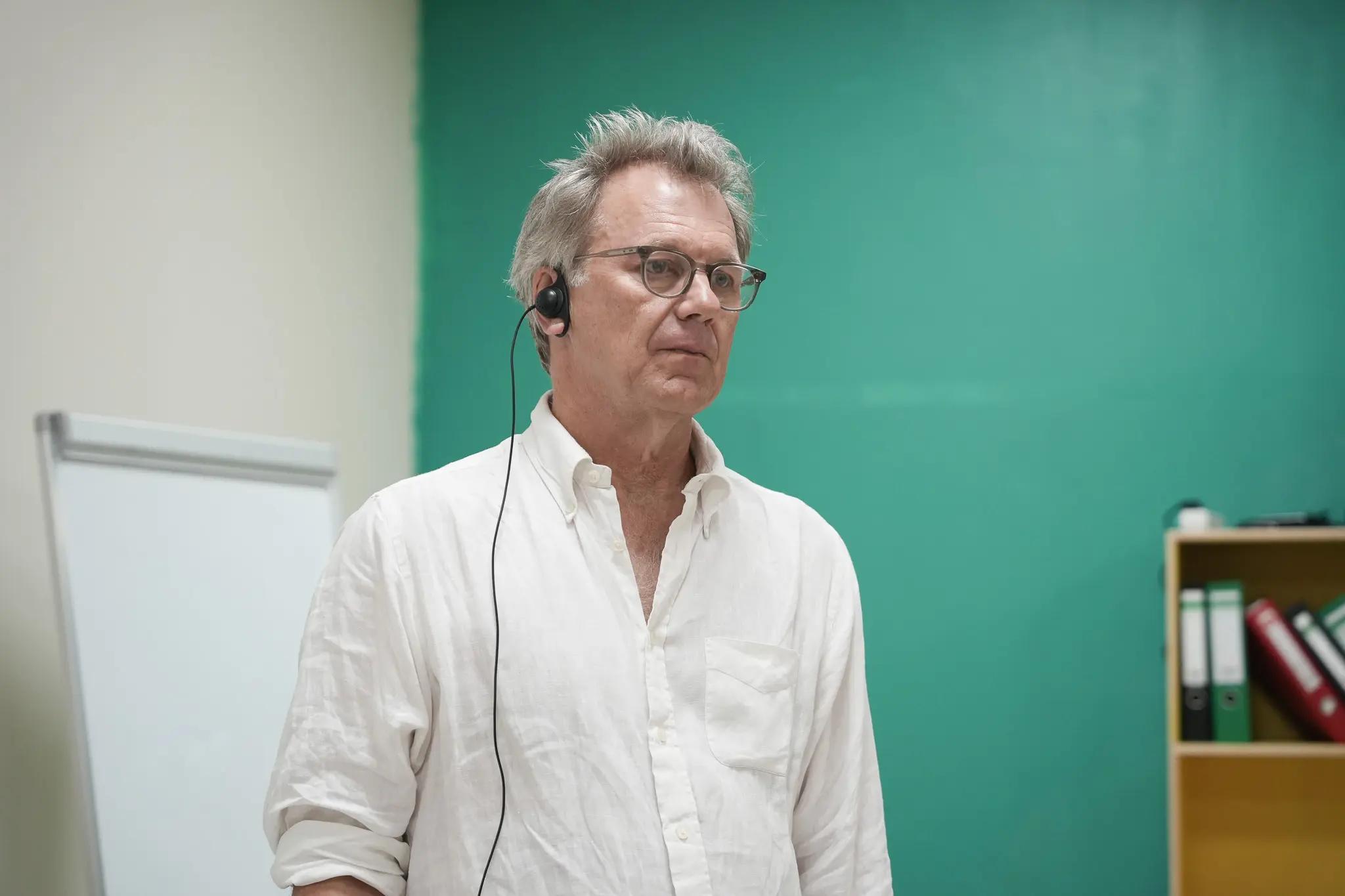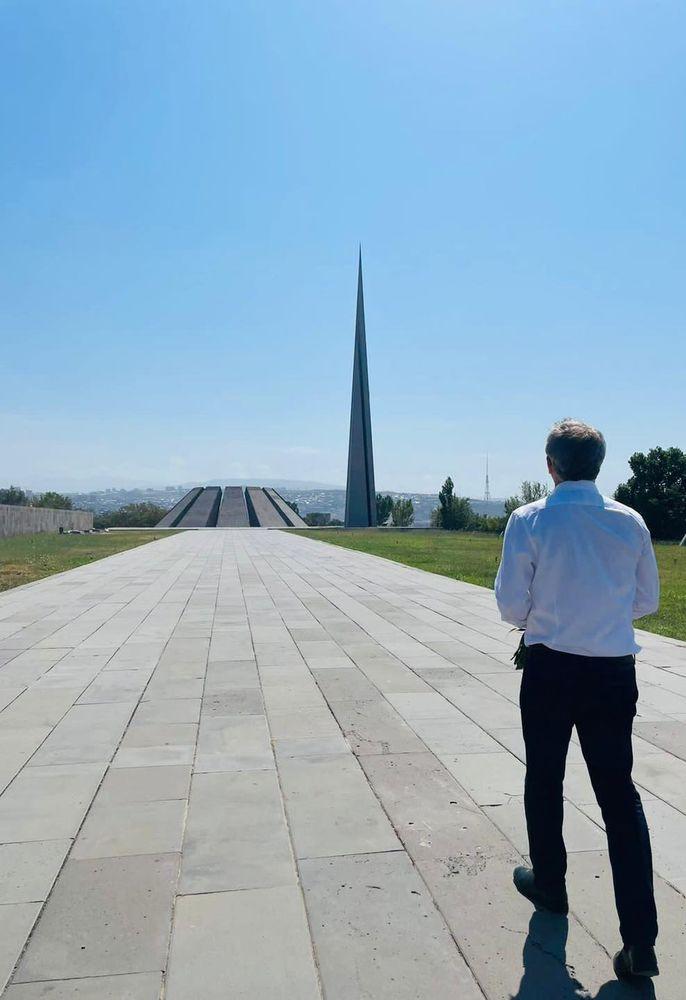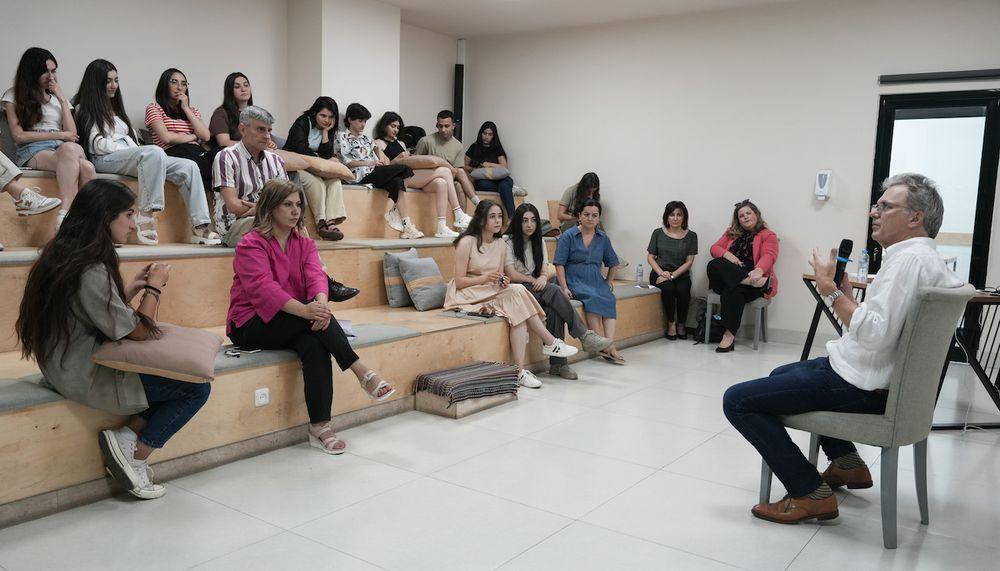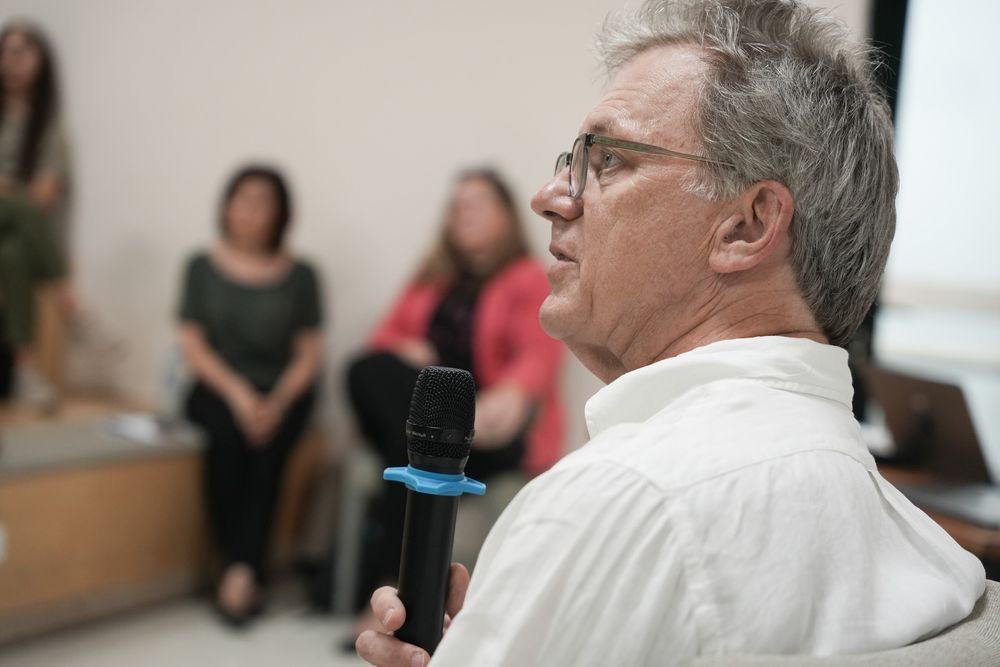
California Documentary Filmmaker Conducts Workshops in Armenia
Anush Mkrtchyan, Hetq Media Factory
Ted Braun, a professor at the School of Cinematic Arts, the University of Southern California, USA, and a documentary filmmaker, was in Armenia to conduct a three-day documentary workshop for young directors and screenwriters. Ted patiently and thoroughly answered the endless questions of the participants. The three days were impressive and useful, yet they felt brief. I couldn’t manage to ask all the questions I had in mind. I also felt disappointed that only thirteen workshop participants had the privilege of enjoying Ted's expertise. Ted kindly agreed to meet and talk again, and I am delighted to share our conversation with you.
The first revelation occurred when the first question was asked: How did he decide to become a screenwriter-director? It turned out that Ted was a musician.
From Music to Documentary
“I grew up in a small town in rural Vermont with more cows than people. I had the good fortune of crossing paths with a woman who created an after-school music program. Through her and that program, I discovered a love and aptitude for classical music. I was a bassoon player, and through my youth, high school, and college years, I thought that's what I wanted to do with my life. But in the middle of my time at college, through a strange set of circumstances, I ended up deciding not to pursue a life of music and didn't really know what I was going to do. I graduated with a degree in English. I loved the field and thought I might want to become a professor but wasn't quite sure.
I was on a teaching fellowship in Boston after I got out of college when the school where I was teaching asked me if I'd be interested in teaching a course on film. I had run an after-school screening series of films, a screening program at the school, and it had been very successful, and I had fun doing it. I said, “Well, if I'm going to teach a course on film, which I'd be happy to do, I really need to know something about making films”. They said, “Oh, we can help you with that. We have a fund for teachers to study during the summers, so go ahead and take a filmmaking class”. And I did. It was like somebody turned on a light in a dark room. I had never had so much fun. I never felt so fulfilled. What I realized then was that in making films, I had found a way to synthesize the pleasures of being a musician (the discipline and hard work) and creating something that was beautiful and sharing it with an audience. I felt alive and very excited while I was taking this class.
And the guy who was teaching me at Boston was also producing and shooting a feature film that summer. He offered me a job working on the crew, so in the first part of the summer I learned how to make short films. Then, at the end of the summer, I worked on a feature film. By the time that summer was over, I decided, “Oh, this is what I want to do with my life!”. I applied to graduate school, and a year later, I was in Los Angeles studying film at USC, and that was how I got going”. For most of the last 15 years, I've been focused on making feature documentaries and writing scripts about true stories”.
Through Ted Braun's Expert Eyes: Exploring Armenia
Ted was in Armenia for the first time. To the question, if he were to shoot a film in Armenia, what would it be about, he answered without hesitation.
“The thing that's most pressing and, in many ways, most obvious is the unfolding situation in NK [Nagorno-Karabakh] and the ways in which the people of Armenia, here are attempting to respond to it. So I think if I were right now, at this very moment, to try and imagine and think about making a film here, I would be looking at a way to bring that story to life, trying to find the right person or people to follow as that really urgent question unfolded”.
Ted's exploration of Armenia began with a visit to the Armenian Genocide Memorial, leaving a lasting impression on him. He says that the museum establishes a profound connection between the Armenian Genocide and other cultures, people, and stories. He also finds the exhibits to be impressive․
“I was profoundly moved. I think it's one of the most beautiful museums I've been to in my life, and I think it's also one of the most thoughtfully designed and organized museums. By design, I mean the architecture of the entire site; the landscape as well as the physical structure itself, evokes a kind of solemnity, that's appropriate to its subject but also invites you to consider the scale of Armenia's history and the plights that Armenians had to face and the resilience that the Armenians have shown in the face of those atrocities and those repeated attempts to bring Armenian civilization. And that's both very inspiring and humbling.”
Documentaries as a way to make a difference in the world
Throughout the workshop, a recurring question was raised in various forms: What does documentary film give to humanity? Can documentaries effect change in today's world? What can journalists and documentarians do to prevent future tragedies? While documentarians may produce another film about a tragedy after it occurs and win awards, it is hard to imagine that even the most influential film could have prevented the tragedy.
Ted Braun doesn’t have a clear answer to this question.
“I don’t know if they can prevent a tragedy in the sense that they can bring it to a halt. I don't know if the film has that capacity. I think it takes more than a piece of art or a piece of reportage to prevent a tragedy, but they can provoke action, and they can mobilize the consciousness of a part of people around the world. I don't know of a filmmaker that would put themselves through the work and the effort that it takes to bring the story like what's happening in the world without believing that they would make a difference and without some very profound way being committed to changing those situations. So yes, I do believe this kind of work can make a difference.”
How has your renowned documentary "Darfur Now" impacted people's lives? We watched it at Hetq Media Factory, and it left a profound impression. At the end of the film, the Hague Court sentenced some of the perpetrators of the genocide, the war criminals, but they still hold influential positions in Sudan. What changes has your film brought to the lives of those living in Darfur?
“One of those people who were accused by the International Criminal Court of committing crimes is now standing trial. He's coming before the court, and I wouldn't say that ''Darfur now'' is responsible for demanding it up there, but it was part of a larger effort around the world to mobilize the political will to bring someone to justice. On a smaller level, I have students of mine at the University of USC who are Sudanese, who saw that film while they were high school students and talked about how that film changed the way they view their country and changed their view of the government and what was happening there. Not those students in particular but students who were educated in that same circumstance and were part of a movement to change the regime there, a peaceful movement to change the regime, and I can't say that the film caused that to happen I can’t say that because they expressed this to me directly, that film changed the way they view their country. As part of the effect to change the view of a country among people who are growing up into power in a country is to see a different way and to try and take it in a different direction. So that's a small way in which this film may have had a very direct effect on the right inside there.
Some other ways in which the film has had an effect was in the United States. Young Americans viewing the film saw that one of the characters in the film Adam Sterling was able to change law in the United States to try to affect US policy towards Sudan, and they emailed me and said, “You know I saw that, I saw that Adam could do it so I decided to try to do it myself and I succeeded”. And another, you know, very immediate way, was during the immediate period of the release of the film. The UN General Assembly was meeting to discuss the Darfur’s situation and international justice was not on the agenda, they were going to talk about what was going on in Sudan and not bring up the issue of the international Court but there was a screening at the UN of the film: The Head of the General Assembly was there, and the agenda was changed, and the Assembly took up the issue to the International justice.
So those are three examples where things were very directly affected by the presence of the film: the lives of high school students inside Sudan, American young activist students, and the UN”.
"If you're making the same film at the end that you set out to make at the beginning, you haven’t been paying attention.”
This was another interesting formula of Ted about documentary filmmaking. When I asked about his expectations for the film "Darfur Now" and its actual result, he said that the significant changes were primarily in the selection of the main characters.
“When we originally set out, I was looking for three very different sorts of people: a female international aid worker, a translator, and a young kid inside the campsite. As I traveled throughout Sudan, I realized that for a whole host of reasons, there were other more interesting people in more difficult situations that were truer and more reflective of what was happening in Sudan. Probably the two, who are among the most memorable people in the film and who I would have never imagined, had I not been paying enough attention, were Sheikh Ahmed [Ahmed Mohammed Abakar], the leader of the Hamedia camp and Hejeva Adam, a female rebel whose son had been killed and who decided to join and fight to free her region. Those people wouldn't have ended up in the film if I hadn’t been paying attention, and so the film in that way was very different from what I set out”.
Ted's documentary filmmaking formula is: “Find a dramatic character who passionately desires something, has a dream, but faces significant obstacles on the path to achieving it, and then make that story as compelling as possible.”
I ask about Ted's own aspirations and dreams.
"I'm glad we're not on TV, so I can think," he said, laughing, followed by a minute of silence.
“I don't think of myself as a dramatic character, so this is challenging. I think I'm trying to bring stories of unforgettable people who are in some way or another struggling to make the world in some way or another better, more beautiful, or more interesting, and in those efforts, revealing something important about human beings and about why we're here on the planet. So that's what I'm trying to do in my work, and it's difficult”.
“Cultivate your curiosity in the person next to you.”
At the end of our conversation, not just as an accepted formality but as an aspiring journalist and documentarian seeking guidance, I asked Ted for his professional advice for me and other novices in the field.
“Cultivate your curiosity, cultivate your interest in the person next to you on the bus, or the Metro, or whatever it might be — the relative at some boring family function you haven't talked to. Because there might just be a personal story there that you want to tell, or that awakens up something in your imagination that makes you want to tell something. I think curiosity is the beginning of imaginative life and the beginning of wanting to share something with other people; that's in the heart of making films, then bringing new work into the world”.
Ted Braun was in Armenia with the support of the US Embassy in Armenia and under the auspices of the American Film Showcase program of the US Department of State, Bureau of Educational and Cultural Affairs.
 Videos
Videos Photos
Photos



Write a comment